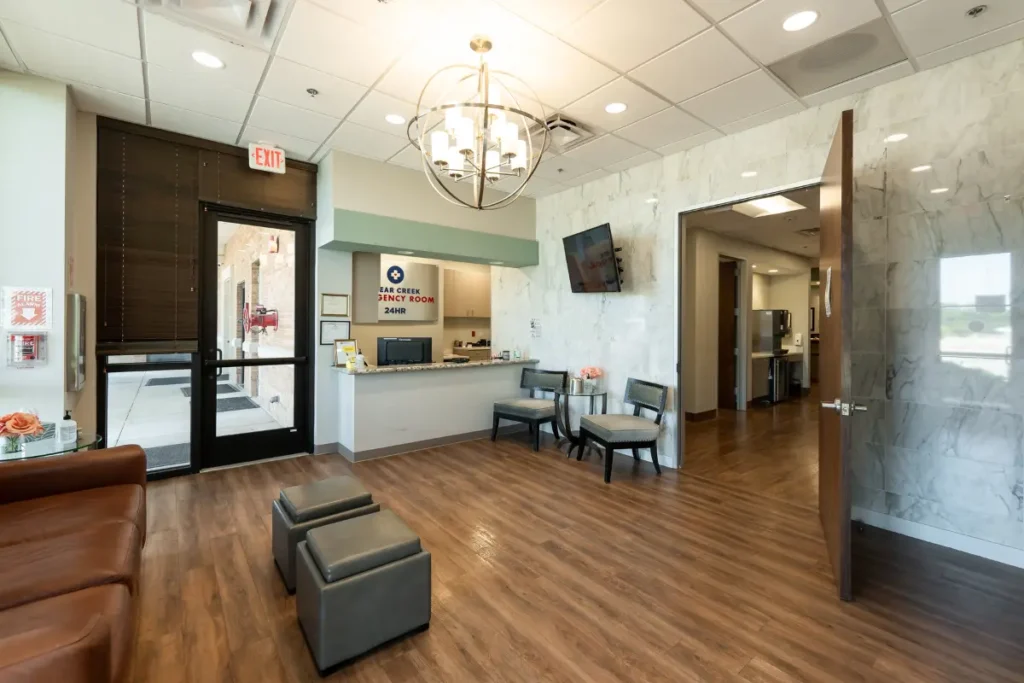Emergency Room for Pneumonia Treatment in Houston, TX
When it comes to treating pneumonia, fast and professional medical care is critical. At Village Emergency Centers, our ER facilities are equipped to provide immediate and comprehensive treatment for pneumonia. With our 24/7 availability and experienced medical team, you can trust that you’ll receive high-quality care in a comfortable and efficient environment, whether you choose to schedule a visit or walk in for emergency care.


Why Choose Us?
Why is the Houston Community Choosing Village Emergency Center for Pneumonia Treatment?
Village Emergency Centers excel in providing compassionate and prompt care for pneumonia. With board-certified physicians, modern diagnostic tools, and a commitment to patient recovery, we are the preferred choice for pneumonia treatment in Houston. We focus on delivering quality care when your health needs urgent attention.
What Is Pneumonia?
Pneumonia is a serious lung infection that causes inflammation in the air sacs, leading to symptoms like coughing, difficulty breathing, chest pain, and fever. Pneumonia can affect anyone but is especially dangerous for young children, the elderly, and those with weakened immune systems. If left untreated, pneumonia can lead to severe complications, making early detection and treatment in an emergency room essential.
Signs You Need Emergency Pneumonia Treatment
Pneumonia symptoms can range from mild to severe. Visit Village Emergency Centers if you or a loved one experience any of the following:
These symptoms can worsen quickly, and it’s crucial to seek care in our ER to avoid complications like respiratory failure or sepsis.
How Pneumonia Is Diagnosed and Treated in Our ER
At Village Emergency Centers, we take a thorough approach to diagnosing and treating pneumonia. Our process includes:
Oxygen Therapy
For patients with severe difficulty breathing, we provide oxygen support to help maintain adequate oxygen levels.
Medications
Depending on the type of pneumonia, we offer antibiotics or antiviral medications to combat the infection.
Chest X-rays
To visualize the lungs and detect areas of infection or fluid buildup.
Blood Tests
To identify the cause of the infection and assess overall health.
We focus on fast diagnosis and personalized treatment to ensure you’re on the path to recovery as quickly as possible.
Walk-In Pneumonia Treatment – No Appointment Needed
At Village Emergency Centers, we offer walk-in services for pneumonia treatment, meaning you can receive care at your convenience without needing an appointment. Whether your symptoms begin suddenly or worsen over time, our emergency room teams are ready to provide immediate assistance, ensuring you receive fast and effective care.
FAQs About Falls and Injury

What Our Patients are Saying About Our Emergency Care Services
Amy Trim
League City
“This emergency room is absolute AMAZING. Both my husband & I have been treated here & have had phenomenal experiences. They always treat you with love & respect. They run all of the tests that are needed, but they don’t add a bunch of unnecessary test. We all know that doctors are human, but sometimes I think some doctors forget that but not at Clear Creek Emergency Room. Dr. Luna, Dr. Cruz, and Rommel, RN are amazing!”
Keyla H
Clear Creek
“I recently had an experience at the Clear Creek Emergency Room that exceeded my expectations. The staff was incredibly fast and efficient, ensuring that I received the care I needed without unnecessary delays. I was particularly impressed by great bedside manner of Doctor Cruz and highly skilled nurse Rommel who attended to me. I truly appreciate the dedication and efficiency of the entire team. Thank you for providing such exceptional care!”
Isela Luna
Jersey Village
“I was pleased to know there’s a place to get urgent care when needed. I was taken care off promptly and efficiently. Dr. Luna treated me with respect and was very informative about my health condition. I actually was in and out of there in 3 hours. Everything was explained to me and I am happy to know there’s a place like this Jersey Village ER. Hopefully, I will not need to return but if I need to I know I will get great care. Thank you Dr Luna and staff.”
